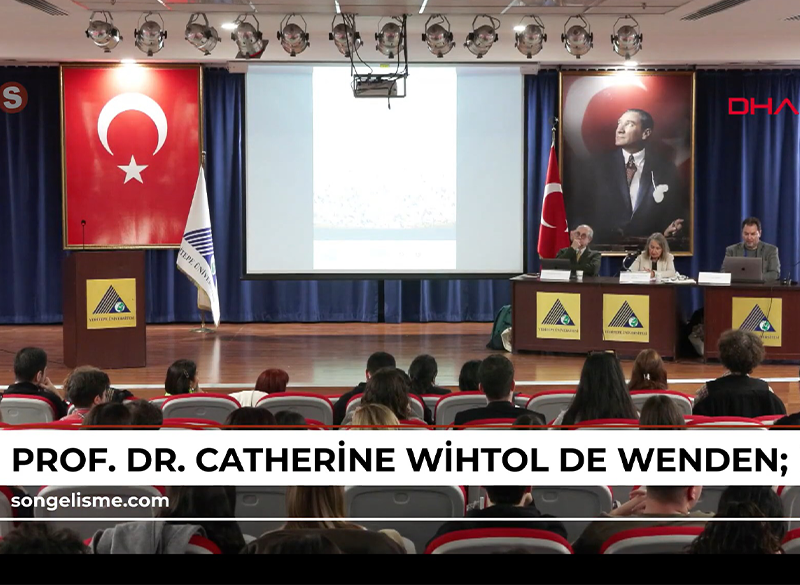Prof. Dr. Catherine Wihtol de Wenden: “There Are 304 Million Migrants Worldwide, Effective Global Governance Is Essential”

‘NGOs and Workers Must Cooperate on Migration Challenges ’
At the 9th International Conference on Migration in the 21st Century hosted by Yeditepe University, scholars discussed the growing global mobility, border policies, and the need for international governance in migration management. Speaking at the conference, Prof.Catherine Wihtol de Wenden from Sciences Po Paris stated:
“Today, 304 million people across the world live in a migrant status. We need a global approach to migration governance. Cooperation between not only states, but also civil society organizations, individuals, and migrant workers is essential. Since most migrants are part of the global workforce, building an effective governance model on a global scale has become a critical necessity for managing migration.”
The conference was jointly organized by Yeditepe University Center for Global Education and Cultural Studies (KEKAM) and Galatasaray University European Research and Documentation Center (CREDE).
It brought together scholars specializing in migration and international relations, featuring guest speakers including Prof. Dr. Catherine Wihtol de Wenden (Sciences Po Paris), Prof. Dr. Jean Marcou, and Prof. Dr. Daniel Meier (Sciences Po Grenoble).
Wenden: “The Number of International Migrants Has Doubled in the Last 30 Years”
Presenting recent global data, Prof. Dr. Wihtol de Wenden noted:
“According to United Nations figures, as of 2024, approximately 304 million people live outside their country of birth, accounting for about 3.7% of the world’s population. Over the past three decades, the number of international migrants has nearly doubled.The forcibly displaced population—refugees, asylum seekers, internally displaced persons, and stateless individuals—has surpassed 123 million, reaching the highest level in recorded history. The main drivers of this increase include war, conflict, persecution, climate change, and economic inequality.”
Prof. Wihtol added that 42.7 million are refugees, 73.5 million are internally displaced, and 8.4 million are asylum seekers”
4.4 Million People Are Stateless
Prof.Wihtol de Wenden highlighted that 4.4 million people are classified as stateless:
“These individuals are deprived of citizenship and face severe restrictions in accessing basic rights such as education, healthcare, and freedom of movement. As of 2024, about 69% of the global refugee population originates from just five countries: Venezuela (6.2 million), Syria (6.0 million), Afghanistan (5.8 million), Ukraine (5.1 million), and South Sudan (2.3 million). Likewise, around 37% of refugees and people in need of international protection are hosted by only five countries: Iran (3.5 million), Turkey (2.9 million), Colombia (2.8 million), Germany (2.7 million), and Uganda (1.8 million). These figures show that the global burden of displacement is distributed unequally, with low- and middle-income countries hosting the majority of the world’s refugees.””
Global Migration Governance Is a Necessity
Prof. Wihtol further explained:
“Within countries, the total number of people on the move is around 850 million, meaning international migrants represent roughly one-third of total mobility. Migration is often tied to a specific goal or project and demands financial, human, and economic resources, making it a challenging process. Most migrants relocate to geographically proximate regions—Afghans, Syrians, and Ukrainians being recent examples. Developing countries experience more intense migration flows but often lack structured migration policies comparable to those in Western states. Meanwhile, the United States continues to receive large numbers of migrants, and post-war movements between Russia and Ukraine remain significant. Overall, the need for global governance mechanisms is more urgent than ever.”
‘Europe Has Shifted from a Destination to a Source of Migration’
Addressing Türkiye's position, Prof. Wihtol de Wenden said:
“Türkiye is both a receiving and sending country in migration dynamics. It hosts one of the largest migrant populations in Europe, with nearly four million Syrians seeking refuge following the civil war. This has reshaped the country’s social and cultural landscape. Europe, once primarily a destination for migrants, is now also becoming a region of emigration. These shifts highlight the interdependence among nations in managing migration. Hence, an inclusive international governance approach is vital—one that involves not only governments but also NGOs, individuals, and workers. Because those who migrate are often part of the labor force, effective governance on a global scale is essential for sustainable migration management.”.
Marcou: “Türkiye Has Become a Transit Country”
Prof. Jean Marcou emphasized the dual nature of modern migration:
“Advances in transport and logistics have made movement easier, yet restrictive state policies, especially visa requirements, pose new barriers. For Türkiye, the past decade has been a complex period. Historically, it was a country of immigration; from the 1960s onward, it became a country of emigration to Europe, and since the 1980s, it has emerged as a key transit country. Migration today intersects with multiple domains: economic, political, and humanitarian.””
Meier: “Migrants Are Not Passive Actors in the International System”
Prof. Dr. Daniel Meier noted:
“Recent trends show increasing migratory pressure from the Global South toward the North, prompting the European Union to tighten its Mediterranean policies. These restrictive measures generate new tensions in Southern regions. Managing migration requires both economic and institutional capacity, while also balancing control-oriented measures. Migration is now a key axis of European foreign policy.In my presentation, I will address the ‘gray zones’ of migration—how refugees and migrants are kept in border areas or islands, and how European states allocate resources to manage these flows. Migration is a multi-layered phenomenon, and migrants are not passive but central actors in the international system. Understanding this complexity is crucial for students studying migration today.”